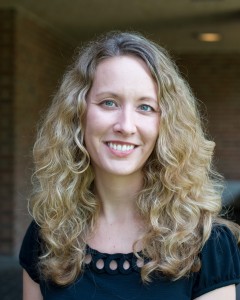Sexual assault among college students has gained prominence as a topic in recent years, but that doesn’t mean that assaults are more frequent than in previous years, said Zoe Peterson, associate professor of psychological sciences at the University of Missouri–St. Louis.

Zoe Peterson, associate professor of psychological sciences, discusses myths about rape and sexual assault and how to change campus culture. (Photo by August Jennewein)
“Universities have become responsible for responding in a more proactive way to sexual assault reports than in the past and that has really called a lot of attention to the subject,” Peterson said. “That means that reports are more visible and that more action has to be taken. There’s been a sudden increase in interest, which is great. I also think we’re getting better and better information about how common it is.”
Peterson will be among four keynote presenters at “Responding to Sexual Assault on College Campuses: Changing Climate and Helping Survivors.” The event is part of the Hellen and Will Carpenter Series on Contemporary Issues in American Society and will take place at 7 p.m., April 28 in the auditorium of the J.C. Penney Building/Conference Center.
The seminar also features Tara Galovski, associate professor of psychological sciences; Daniel Isom, Endowed Professor of Policing and the Community; and Forrest Van Ness, UMSL’s director of institutional safety and chief of police. Topics will range from prevention to support and treatment for survivors.
UMSL Daily caught up with Peterson for a preview of the topic.
What is your role in the seminar?
My role is to talk about the context of sex assault among college students. Who is it happening to and in what context is it occurring? What are some of the myths we have about rape among college students and what are the realities about what rape looks like on college campuses?
I’m going to talk primarily about context. Most rapes on college campuses are perpetrated by someone the woman knows, and often in party-like settings. I’m also going to talk a little bit about how we might think about changing campus culture to prevent rapes from happening.
How do you think we can change campus culture?
I think there are a variety of things we can do. I think in general, students, faculty and staff should not tolerate sexism. Colleges shouldn’t tolerate situations where men are giving each other messages that they’re entitled to sex where sex is seen as competition among men – who can have the most. Also, challenging rape myths.
What are some of the myths that are out there about rape?
When people say that rape is this thing that only occurs in back alleys, we need to challenge that. That’s not what the research shows.
We need to challenge myths that blame the victim. People will often say, “That happened to that woman but she was dressed a certain way, or she was really drunk.” We should all challenge those things and stand up to that.
How has the focus on rape prevention changed over the years?
In the past, rape prevention was aimed at telling women to limit their own behavior. This is bad for a number of reasons and it is often based on rape myths.
We often tell women to not walk alone at night. That’s fine advice, but most rape isn’t happening when women are walking alone outside at night. Most rapes happen when people are on dates, at parties or when they’re hanging out with friends in a dorm room. Telling women not to walk alone at night is not likely to prevent women from being raped.
Women are often told things like don’t drink too much or don’t go to places where men might be predators. This tells them that they’re responsible for limiting their behavior to protect themselves instead of holding perpetrators responsible for their behavior.














